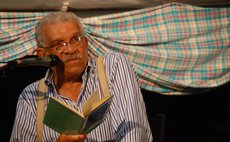Focus for living
One of the biggest mistakes which we make is the assumption that the most important influence in our lives is political affiliation. In most countries, the only thing which apparently fires the imagination and captivates the human spirit is the call to action by a political party. From our experience, people who have apparently been half-dead suddenly find new life. At long last, they have found a cause for which to live and sometimes a cause to which to die.
Such people often betray a deep insecurity. They have no self-confidence, little self-esteem. They often lack a sense of human dignity. They are looking for something outside of themselves to give them a sense of purpose in life, while they ignore the priceless treasure which lies in their hearts.
Many people live in a state of sadness. Some live in a condition akin to despair. They sense that life needs security and hope. Indeed, these are the very basis for a happy life, which eludes them.
Many there are who unwittingly live in a prison. No, their home is not at the Stock Farm or behind prison bars. But their locks and bars are their so-called friends, their social clubs and their social conventions. Their prisons are the corrosive desires and aspirations within which they confine themselves.
Throughout the world, there is war, there is violence, uncontrolled anger and aggressive behaviour because people have not yet found a proper focus for their lives. They look in vain and find nothing but emptiness. In their despair, they cling to straws in their adamant search for a human saviour.
Often it has been said that our people lack a work-ethic. This has been given as one of the fundamental reasons for our lack of development. Now this is not quite true. What is lacking is motivation, a sense of purpose.
Work as such has no value in itself. It is the motive that spurs man to work and drives him on to productive activity. If he perceives happy prospects from his labour, he will work. If the society in which he lives is such as to inspire him to work for the common good, he will work. If he experiences solidarity and real fellowship, he will most likely be led to work. Sometimes people are not inspired to exert themselves because they do not see themselves as part of the scheme of things.
However, there are many people in history who have laboured, not for wealth, not for power, not for worldly esteem but for the welfare of their fellow-men. The good which they promoted transcended all consideration of personal advantage. Some gave up all their wealth and power and sacrificed their lives for their brothers and sisters. These people did not seek human approval or human recognition. They served no human master. They lived on a higher plane and so were able to transcend all those self-serving drives that are usually to be found in men and women.
People need much more than material things for a happy life. They need a compassionate mind and a compassionate heart. They need a presence to comfort them. They need human solidarity without any consideration of party political affiliation or religious persuasion. They do not need paternalism. They need love.
Our education has made tremendous strides. Today our students are much more equipped for the world market than those of fifty years ago. This is a tremendous blessing. After all, we live in a global village. Our people must be prepared for employment in any part of the world.
The great problem, however, we have, not only with our philosophy of education but also with our culture, is that we have imbibed completely the mindset of those who once enslaved us or dominated our lives. The imperialist ethic hangs around our necks and threatens to strangle us. Our whole thrust is on winning, winning, winning at all costs. There are no consolation prizes. When are we going to reward those who lose when there is evidence of hard work?
What we need in our society is a new focus for living. We need a society with a culture of love, of respect, of compassion. We need a reason to exist, a sense of belonging, a sense of purpose, a reason to labour, to carry us on. Only a power beyond our limited selves, beyond our selfish pursuits, beyond our all too human dreams and aspirations, can give us a sense of well-being and a motive for human progression, and make us exclaim: "Yes, it is good to be alive!"




